动词ing作状语
- 格式:doc
- 大小:33.00 KB
- 文档页数:4
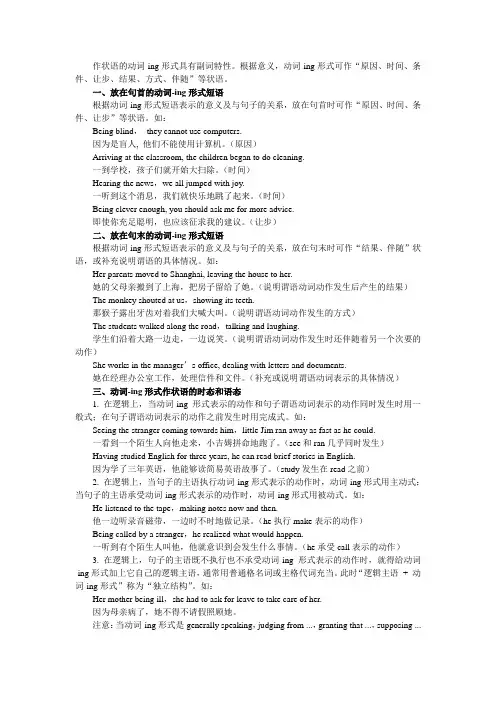
作状语的动词-ing形式具有副词特性。
根据意义,动词-ing形式可作“原因、时间、条件、让步、结果、方式、伴随”等状语。
一、放在句首的动词-ing形式短语根据动词-ing形式短语表示的意义及与句子的关系,放在句首时可作“原因、时间、条件、让步”等状语。
如:Being blind,they cannot use computers.因为是盲人, 他们不能使用计算机。
(原因)Arriving at the classroom, the children began to do cleaning.一到学校,孩子们就开始大扫除。
(时间)Hearing the news,we all jumped with joy.一听到这个消息,我们就快乐地跳了起来。
(时间)Being clever enough, you should ask me for more advice.即使你充足聪明,也应该征求我的建议。
(让步)二、放在句末的动词-ing形式短语根据动词-ing形式短语表示的意义及与句子的关系,放在句末时可作“结果、伴随”状语,或补充说明谓语的具体情况。
如:Her parents moved to Shanghai, leaving the house to her.她的父母亲搬到了上海,把房子留给了她。
(说明谓语动词动作发生后产生的结果)The monkey shouted at us,showing its teeth.那猴子露出牙齿对着我们大喊大叫。
(说明谓语动词动作发生的方式)The students walked along the road,talking and laughing.学生们沿着大路一边走,一边说笑。
(说明谓语动词动作发生时还伴随着另一个次要的动作)She works in the manager’s office, dealing with letters and documents.她在经理办公室工作,处理信件和文件。
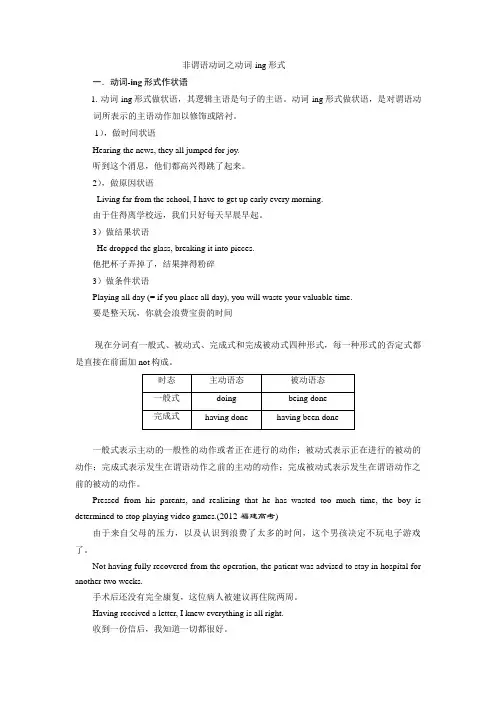
非谓语动词之动词-ing形式一.动词-ing形式作状语1. 动词-ing形式做状语,其逻辑主语是句子的主语。
动词-ing形式做状语,是对谓语动词所表示的主语动作加以修饰或陪衬。
1),做时间状语Hearing the news, they all jumped for joy.听到这个消息,他们都高兴得跳了起来。
2),做原因状语Living far from the school, I have to get up early every morning.由于住得离学校远,我们只好每天早晨早起。
3)做结果状语He dropped the glass, breaking it into pieces.他把杯子弄掉了,结果摔得粉碎3)做条件状语Playing all day (= if you place all day), you will waste your valuable time.要是整天玩,你就会浪费宝贵的时间现在分词有一般式、被动式、完成式和完成被动式四种形式,每一种形式的否定式都是直接在前面加not构成。
一般式表示主动的一般性的动作或者正在进行的动作;被动式表示正在进行的被动的动作;完成式表示发生在谓语动作之前的主动的动作;完成被动式表示发生在谓语动作之前的被动的动作。
Pressed from his parents, and realizing that he has wasted too much time, the boy is determined to stop playing video games.(2012·福建高考)由于来自父母的压力,以及认识到浪费了太多的时间,这个男孩决定不玩电子游戏了。
Not having fully recovered from the operation, the patient was advised to stay in hospital for another two weeks.手术后还没有完全康复,这位病人被建议再住院两周。

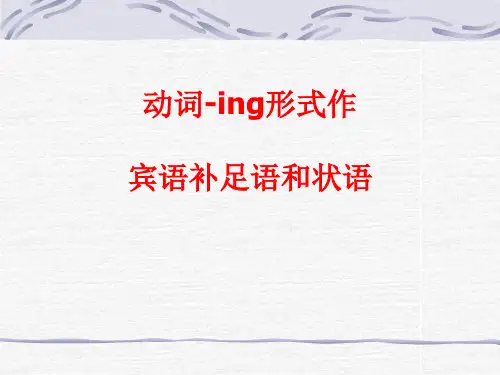
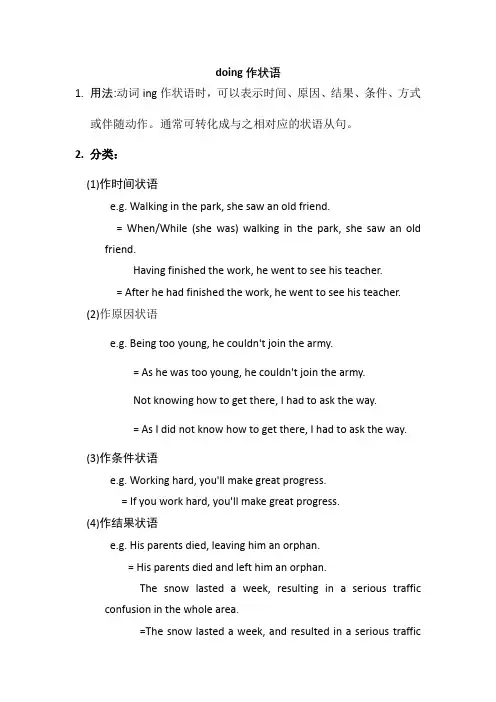
doing作状语1.用法:动词ing作状语时,可以表示时间、原因、结果、条件、方式或伴随动作。
通常可转化成与之相对应的状语从句。
2.分类:(1)作时间状语e.g. Walking in the park, she saw an old friend.= When/While (she was) walking in the park, she saw an old friend.Having finished the work, he went to see his teacher.= After he had finished the work, he went to see his teacher.(2)作原因状语e.g. Being too young, he couldn't join the army.= As he was too young, he couldn't join the army.Not knowing how to get there, I had to ask the way.= As I did not know how to get there, I had to ask the way.(3)作条件状语e.g. Working hard, you'll make great progress.= If you work hard, you'll make great progress.(4)作结果状语e.g. His parents died, leaving him an orphan.= His parents died and left him an orphan.The snow lasted a week, resulting in a serious traffic confusion in the whole area.=The snow lasted a week, and resulted in a serious trafficconfusion in the whole area.注意:动词ing形式与不定式均可作结果状语,区别是:动词ing 形式表示顺其自然、意料之中的结果,而不定式则表示不愿看到的、出人意料的结果。
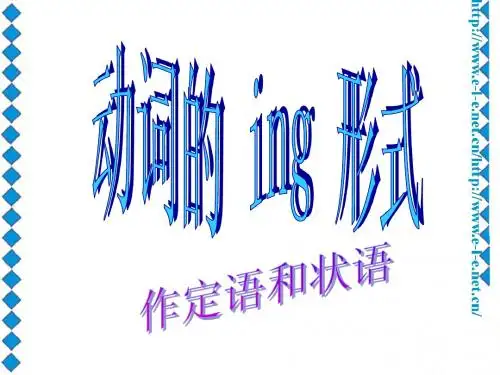
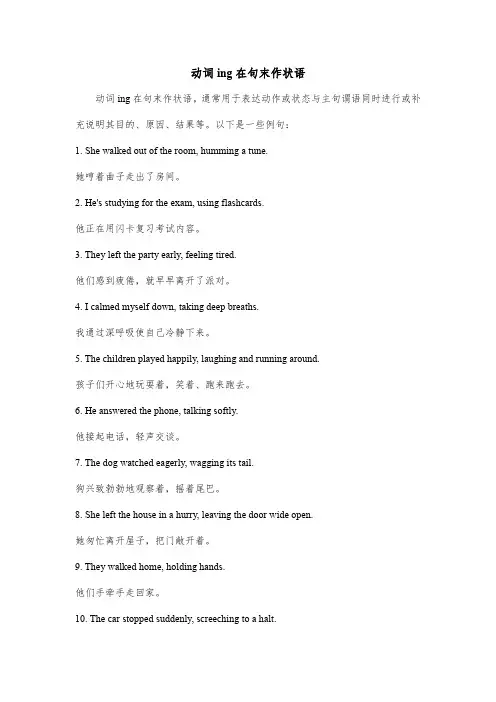
动词ing在句末作状语动词ing在句末作状语,通常用于表达动作或状态与主句谓语同时进行或补充说明其目的、原因、结果等。
以下是一些例句:1. She walked out of the room, humming a tune.她哼着曲子走出了房间。
2. He's studying for the exam, using flashcards.他正在用闪卡复习考试内容。
3. They left the party early, feeling tired.他们感到疲倦,就早早离开了派对。
4. I calmed myself down, taking deep breaths.我通过深呼吸使自己冷静下来。
5. The children played happily, laughing and running around.孩子们开心地玩耍着,笑着、跑来跑去。
6. He answered the phone, talking softly.他接起电话,轻声交谈。
7. The dog watched eagerly, wagging its tail.狗兴致勃勃地观察着,摇着尾巴。
8. She left the house in a hurry, leaving the door wide open.她匆忙离开屋子,把门敞开着。
9. They walked home, holding hands.他们手牵手走回家。
10. The car stopped suddenly, screeching to a halt.车突然停下来,发出刺耳的刹车声。
11. He finished his dinner, burping loudly.他吃完晚饭,打了一个响亮的饱嗝。
12. She tripped on the stairs, tumbling down to the bottom.她在楼梯上绊倒了,摔倒了底部。
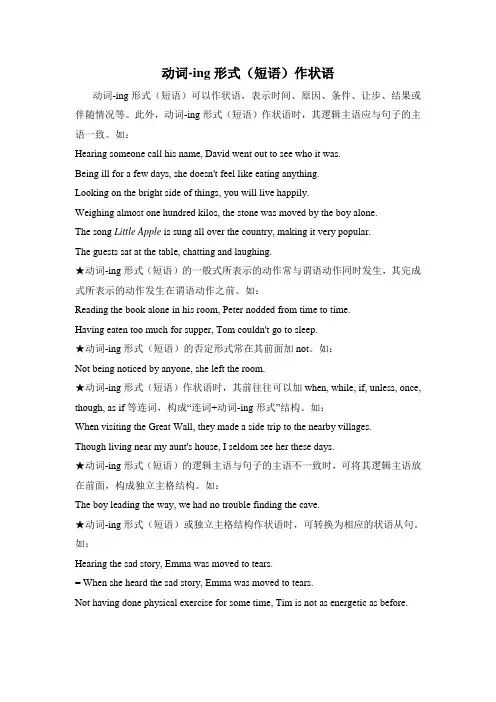
动词-ing形式(短语)作状语动词-ing形式(短语)可以作状语,表示时间、原因、条件、让步、结果或伴随情况等。
此外,动词-ing形式(短语)作状语时,其逻辑主语应与句子的主语一致。
如:Hearing someone call his name, David went out to see who it was.Being ill for a few days, she doesn't feel like eating anything.Looking on the bright side of things, you will live happily.Weighing almost one hundred kilos, the stone was moved by the boy alone.The song Little Apple is sung all over the country, making it very popular.The guests sat at the table, chatting and laughing.★动词-ing形式(短语)的一般式所表示的动作常与谓语动作同时发生,其完成式所表示的动作发生在谓语动作之前。
如:Reading the book alone in his room, Peter nodded from time to time.Having eaten too much for supper, Tom couldn't go to sleep.★动词-ing形式(短语)的否定形式常在其前面加not。
如:Not being noticed by anyone, she left the room.★动词-ing形式(短语)作状语时,其前往往可以加when, while, if, unless, once, though, as if等连词,构成“连词+动词-ing形式”结构。
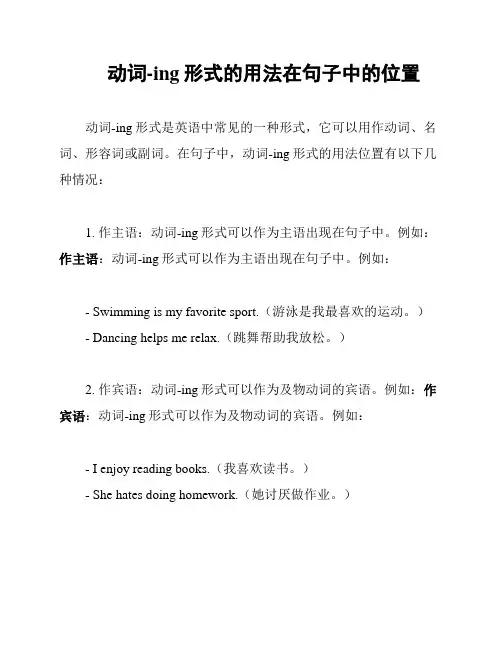
动词-ing形式的用法在句子中的位置动词-ing形式是英语中常见的一种形式,它可以用作动词、名词、形容词或副词。
在句子中,动词-ing形式的用法位置有以下几种情况:1. 作主语:动词-ing形式可以作为主语出现在句子中。
例如:作主语:动词-ing形式可以作为主语出现在句子中。
例如:- Swimming is my favorite sport.(游泳是我最喜欢的运动。
)- Dancing helps me relax.(跳舞帮助我放松。
)2. 作宾语:动词-ing形式可以作为及物动词的宾语。
例如:作宾语:动词-ing形式可以作为及物动词的宾语。
例如:- I enjoy reading books.(我喜欢读书。
)- She hates doing homework.(她讨厌做作业。
)3. 作表语:动词-ing形式可以作为表语出现在句子中,表示主语的状态或特征。
例如:作表语:动词-ing形式可以作为表语出现在句子中,表示主语的状态或特征。
例如:- His favorite activity is playing soccer.(他最喜欢的活动是踢足球。
)- The most interesting thing about him is his singing ability.(关于他最有趣的事情就是他的唱歌能力。
)4. 作定语:动词-ing形式可以作为定语修饰名词或代词。
例如:作定语:动词-ing形式可以作为定语修饰名词或代词。
例如:- The running water is very clear.(流动的水非常清澈。
)- She bought a loving gift for her mother.(她给妈妈买了一个充满爱意的礼物。
)5. 作状语:动词-ing形式可以作为状语修饰动词、形容词或副词,表示时间、原因、条件等。
例如:作状语:动词-ing形式可以作为状语修饰动词、形容词或副词,表示时间、原因、条件等。
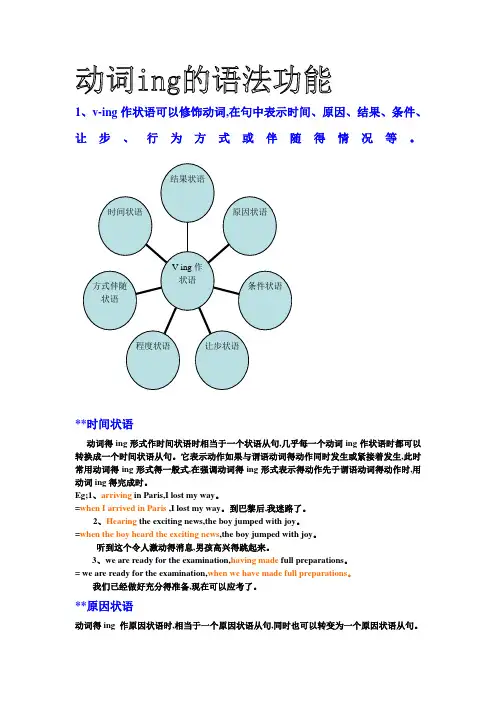
1、v-ing作状语可以修饰动词,在句中表示时间、原因、结果、条件、让步、行为方式或伴随得情况等。
**时间状语动词得ing形式作时间状语时相当于一个状语从句,几乎每一个动词ing作状语时都可以转换成一个时间状语从句。
它表示动作如果与谓语动词得动作同时发生或紧接着发生,此时常用动词得ing形式得一般式,在强调动词得ing形式表示得动作先于谓语动词得动作时,用动词ing得完成时。
Eg;1、arriving in Paris,I lost my way。
=when I arrived in Paris ,I lost my way。
到巴黎后,我迷路了。
2、Hearing the exciting news,the boy jumped with joy。
=when the boy heard the exciting news,the boy jumped with joy。
听到这个令人激动得消息,男孩高兴得跳起来。
3、we are ready for the examination,having made full preparations。
= we are ready for the examination,when we have made full preparations。
我们已经做好充分得准备,现在可以应考了。
**原因状语动词得ing 作原因状语时,相当于一个原因状语从句,同时也可以转变为一个原因状语从句。
它表示得原因得动词ing 形式短语一般置于句首。
Eg;1、having smoked too much ,he has suffered from lung cancer。
=as he has smoked too much ,he has suffered from lung cancer由于抽烟过多,她得了肺癌。
2、living far from my pany,I have to get up early。

词-ing形式作状语动词-ing形式作状语可以修饰谓语动词或整个句子,表示时间、原因、结果、条件、让步、方式、伴随或补充。
1.表示时间:动词-ing形式作时间状语,相当于一个时间状语从句。
句首或句末 Turning around, she saw a car driving up.=When she turned around, she saw a car driving up.她转过身,看见一辆车朝她开来。
2.表示原因:表示原因的动词-ing形式一般置于句首,相当于一个原因状语从句。
句首句中或句末 Being ill, he could not walk any further.=As he was ill, he could not walk any further.因为疲倦,他不能再往前走了。
3.表示结果:动词-ing形式作状语表示一种必然的结果,可扩展为一个含有并列谓语的简单句。
句末 The fire lasted nearly a month, leaving nothing valuable.=The fire lasted nearly a month, and left nothing valuable.大火持续了近一个月,几乎没剩下什么值钱的东西。
4.表示条件:动词-ing形式作条件状语,相当于一个条件状语从句。
句首 Being more careful, you can make fewer mistakes.=If you are more careful, you can make fewer mistakes.更细心点,你就会少犯错误。
5.表示让步动词-ing形式作让步状语,相当于一个让步状语从句。
句首 Knowing all this, they made me pay for the damage.=Although they knew all this, they made me pay for the damage.尽管知道了一切情况,他们还是要我赔偿损失。
2019高考英语语法:动词的-ing形式作状语动词的-ing形式可以作状语,修饰动词,在句中表示时间、原因、结果、条件、让步、行为方式或伴随情况等。
-ing形式作时间、原因、条件、让步状语时多位于句首;作结果、伴随情况状语时常位于句末。
1.表示时间,相当于一个时间状语从句。
Seeing those pictures, she remembered her childhood.看到那些画,她想起了自己的童年。
(= When she saw those pictures...)Having made full preparations, we are ready for the examination.我们已经作好了充分准备,现在可以应考了。
(= After we have made full preparation...)2.表示原因,相当于一个原因状语从句。
Not knowing his address, I can’t send this book to him.因为不知道他的地址,我不能把这本书送给他。
(= As I don’t kno w his address...) Being ill, he didn’t go to school yesterday.由于生病,他昨天没有上学。
(= Since he was ill...)3.表示结果,相当于一个并列谓语。
His father died, leaving him a lot of money. 他父亲死了,留给他许多钱。
(= ... and left him a lot of money)She was so angry that she threw the toy on the ground, breaking it into pieces.她非常生气,把玩具扔在地上,摔成了碎片。
(= ... and broke it into pieces...)4.表示条件,相当于一个条件状语从句。
ing分词作状语用法"ing"分词作状语是指将动词的现在分词形式作为句子中的状语,用来修饰句子的主语、谓语、宾语或整个句子。
"ing"分词作状语时可以表达时间、原因、方式、结果等不同的含义。
有以下几种常见的用法:1. 时间状语:表示主动的动作与谓语动词同时进行,或者谓语动作在其之后发生。
例如:- Walking in the park, I saw a beautiful flower. (当我在公园里散步时,我看到了一朵美丽的花。
)- After finishing my homework, I went to bed. (完成作业后,我去睡觉了。
)2. 原因状语:表示动词的原因或理由。
例如:- Being tired, she decided to take a nap. (因为累了,她决定小睡一会儿。
)- Knowing that she was late, he ran to catch the bus. (知道她迟到了,他跑去赶公车。
)3. 方式状语:表示动作的执行方式或方式特征。
例如:- She spoke to the audience, using simple and clear language. (她向观众们讲话时,使用简单明了的语言。
)- He drove home, carefully avoiding any traffic violations. (他小心地开车回家,避免任何交通违章。
)4. 结果状语:表示主句动作的结果。
例如:- The wind was blowing, making the trees sway. (风吹得树木摇摆不定。
)- The girl fell off her bike, hurting her knee. (女孩从自行车上摔下来,伤到了膝盖。
)需要注意的是,"ing"分词作状语时,一般位于句子的开头或中间,与句子的主语之间不加逗号分隔。
ing做状语"ing"作为状语时,通常可以表达动作的同时进行、原因、方式、条件等含义。
以下是一些常见用法和例句:1. 时间状语:表示动作的同时进行。
- She was singing while cooking dinner.(她一边做饭一边唱歌。
)- They were laughing and playing in the park.(他们在公园里笑着玩耍。
)2. 原因状语:表示动作的原因或引起的结果。
- He lost his keys, making him late for work.(他丢了钥匙,导致他上班迟到。
)- Being tired, she decided to take a nap.(因为累了,她决定小睡一会儿。
)3. 方式状语:表示动作的方式或方式特征。
- She won the race by running fast.(她通过跑得快赢得了比赛。
)- He solved the problem by studying hard.(他通过努力学习解决了问题。
)4. 条件状语:表示动作发生的条件。
- Having enough money, they decided to go on a trip.(有足够的钱,他们决定去旅行。
)- Without your help, we couldn"t have finished the project.(没有你的帮助,我们无法完成这个项目。
)需要注意的是,使用"ing"作为状语时,要确保逻辑上的连贯性和语法正确性。
同时,根据具体语境和句子结构的需要,可能还需要结合其他词或短语来表达更完整的意思。
1.v-ing作状语可以修饰动词,在句中表示时间、原因、结果、条件、让步、行为方式或伴随的情况等。
**时间状语
动词的ing形式作时间状语时相当于一个状语从句,几乎每一个动词ing作状语时都可以转换成一个时间状语从句。
它表示动作如果和谓语动词的动作同时发生或紧接着发生,此时常用动词的ing形式的一般式,在强调动词的ing形式表示的动作先于谓语动词的动作时,用动词ing的完成时。
Eg;1.arriving in Paris,I lost my way。
=when I arrived in Paris,I lost my way。
到巴黎后,我迷路了。
2.Hearing the exciting news,the boy jumped with joy。
=when the boy heard the exciting news,the boy jumped with joy。
听到这个令人激动的消息,男孩高兴得跳起来。
3.we are ready for the examination,having made full preparations。
= we are ready for the examination,when we have made full preparations。
我们已经做好充分的准备,现在可以应考了。
**原因状语
动词的ing 作原因状语时,相当于一个原因状语从句,同时也可以转变为一个原因状语从句。
它表示的原因的动词ing 形式短语一般置于句首。
Eg;1.having smoked too much ,he has suffered from lung cancer。
=as he has smoked too much ,he has suffered from lung cancer
由于抽烟过多,他得了肺癌。
2.living far from my company,I have to get up early。
=because I live far from my company,I have to get up early。
由于住得离公司远,我只好早起。
3.not knowing her address,I might as well call her to come over。
=because I do not know her address,I might as well call her to come over。
不知道她的地址,我只好打电话让她来。
**结果状语
动词的ing作结果状语时,不常用,通常放在句末,中间有逗号。
它可以转化成结果状语从句。
Eg;1.the fire lasted nearly a month,leaving nothing valuable。
大火持续了近一个月,几乎没剩下什么有价值的东西。
**方式、伴随状语
动词ing表示方式或伴随情况是比较常见的,它用来说明发生的背景或情况。
Eg,1.I stood by the door,not daring to say a word。
我站在门旁边,不敢说一句话。
2.my parents wrote me a letter ,telling me to change my job。
我父母来信让换我工作。
3.i lay on the grass,staring at the sky for a long time。
我躺在草地上,长时间的望天空。
4.talking and laughing,the kids walked one by one into the classroom。
孩子们有一个个说有笑的走进教室。
5.theycame running all the way。
他们一路跑过来。
**条件状语
动词的ing作条件状语一般位于句首。
Eg;1.going straight down the road,you will find the department store。
顺着路一直走,你会发现那家百货公司。
2.working hard at your lessons,you will succeed。
如果好好学习,你就能成功。
**让步状语
Eg;1.knowing all this ,I still wanted to see it myself。
尽管知道了这一切,我还是想亲自去看看。
=though I knew all this ,I still wanted to see it myself。
2.working hard as he did ,he still failed。
=though he worked hard as he did ,he still failed。
尽管他很努力,他还是失败了。
**程度状语
动词ing形式在习惯上可以作程度状语,常译作;‘很’、‘非常’、‘极度’,也可以与very 互译。
Eg;1.it was freezing cold yesterday。
昨天很冷。
2.she is an amazing girl。
她是一位迷人的女孩。
***补充;
常见的动词ing短语。